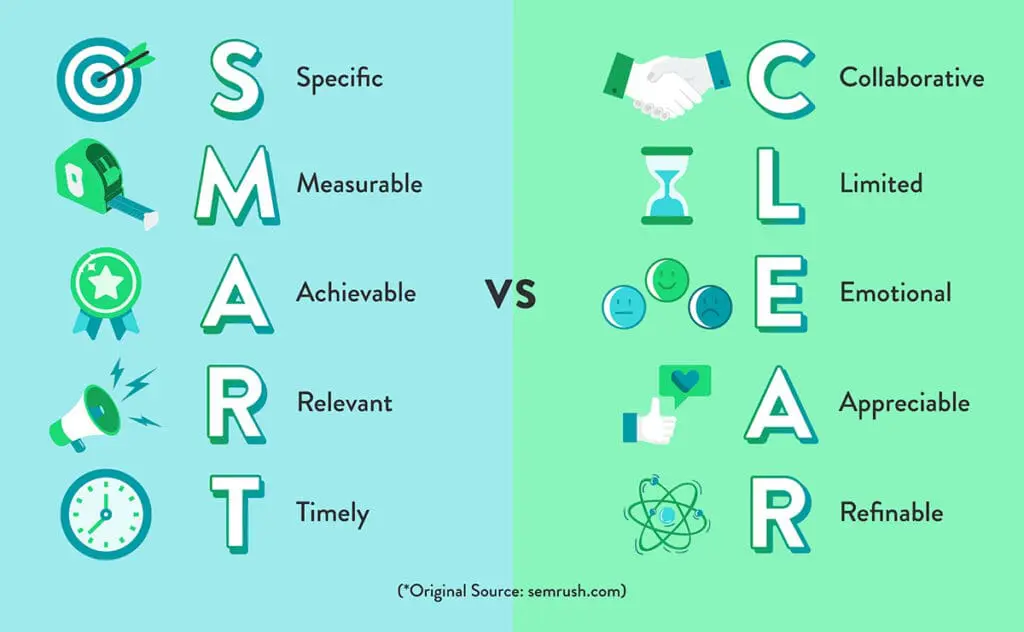SMART vs CLEAR Goals: Which is Better to Find a Job?

Do you want to achieve your goals in finding a job but don’t know where to start? You’ve probably heard of SMART goals, and you may even be using them right now.
But are they the best way to help you find a job in a competitive market?
If you’re looking for a new way to set goals or to enhance your existing framework, it can be helpful to know the difference between SMART goals and CLEAR goals and why CLEAR goals may be a better option for you.
What’s the difference between SMART goals and CLEAR Goals?
SMART Goals are goals that are specific, measurable, achievable, realistic, and time-bound, while CLEAR goals go even further by adding criteria for completeness. This means that you set specific criteria for success so that you know when you have achieved your goal.
CLEAR goals also take collaboration with others into account to identify what you need to do in order to reach the goal.
Everything you need to know about CLEAR Goals:
What are CLEAR goals?
CLEAR stands for Collaborative, Limited, Emotional, Appreciable, and Refinable and can act as an alternative or supplement to SMART goals.
Collaboration in CLEAR goals
Collaboration encourages you to identify potential partners who can help you achieve your goal. You will also be able to identify any resources that may be necessary for success.
This is goes above and beyond SMART goals by creating an environment where collaboration is encouraged and will help you reach your goal.
Limitations in CLEAR goals
CLEAR goals set limits by defining how big or small a goal should be, as well as what resources are available and what outcomes may be expected.
This allows you to focus on the most important elements of the goal without getting overwhelmed by the details.
Emotions in CLEAR goals
CLEAR goals also take into consideration your emotional state and how you can use it to help you reach your goal.
This is done by setting a timeline that gives you enough time to process any emotions that arise throughout the highs and lows of your journey.
Appreciable aspects of CLEAR goals
The appreciable aspects of CLEAR goals are about recognition and appreciation to encourage you to celebrate your accomplishments along the way instead of waiting until the end.
This helps to keep you motivated throughout the goal-setting process, which can lead to better results in the long run.
Refinable aspects of CLEAR goals
The refinable aspects of CLEAR goals give you the ability to adjust your framework as needed.
This allows you to stay agile and make adjustments along the way, ensuring that you are taking into consideration any changes in your needs or the environment around you.

How to set CLEAR goals to find a job
To set CLEAR goals to find a job, be prepared to write down potential collaborators, limitations to keep your goal from becoming overwhelming, any emotions you are feeling, appreciation for milestones you’ll hit, and refinements you can make to your plan as you go.
Collaboration
Identify potential partners and resources that may be necessary for success.
This could be a mentor, a team of people you can work with, a recruiter you’d like to work with or any other type of support you need to find a job.
Limitations
Set limits that will help keep your goal manageable and achievable. This includes setting a timeline, budget, and expectations for outcomes.
This will help to make sure that the goal is realistic and attainable and that you don’t get discouraged while you search for your dream job.
Emotions
Take into consideration your emotional state and set a timeline that allows you to process it along the way.
Make sure to give yourself some time to rest, reflect, and recharge in order to stay motivated throughout the job search process.
Appreciation
Celebrate each milestone along the way and appreciate the progress that you are making. This could mean taking time to reward yourself, or consciously taking the time to recognize the effort you have put in.
This will help to keep you motivated and ensure you stay on track with your goal without feeling overwhelmed or dwelling on the obstacles.
Refinement
Be prepared to adjust your framework if necessary. Things rarely go exactly as planned so remaining refining as you go is not only normal but encouraged.
Take into consideration any changes in your needs or the environment around you so that you can make adjustments as needed to stay agile and continue working towards your finding a new job.
CLEAR goal examples
While CLEAR goals can be used to help you find a job, they can also be leveraged to help in any manner of goal setting, as seen in these examples.
CLEAR goal example 1:
Goal: I want to find a new job within the next year
Collaboration: Reach out to my network and ask for help in finding potential job opportunities or connect with a recruiter.
Limitation: Set aside at least an hour each week to research, apply for, and follow up on jobs.
Emotion: Make sure to take breaks throughout the process so I can stay focused and reduce feelings of stress and overwhelm.
Appreciation: Celebrate each step along the way, such as writing a great cover letter or landing an interview.
Refinement: Be willing to adjust my approach if needed and make sure I am regularly checking in on new job opportunities.
CLEAR goal example 2:
Goal: I want to run a 5K in 3 months.
Collaboration: Find a running buddy who can help me stay motivated and accountable.
Limitation: Set an achievable timeline by training three times a week over the course of 12 weeks.
Emotion: Make sure to set aside time after each run to rest, reflect, and recharge in order to stay focused.
Appreciation: Celebrate and reward myself for every milestone or accomplishment I make along the way.
Refinement: Monitor my progress and be prepared to adjust my training plan over the course of the three months if needed.
CLEAR goal example 3:
Goal: I want to learn a new language in 6 months.
Collaboration: Join an online course or community that can help support me and answer questions as needed.
Limitation: Set aside at least 30 minutes every day to practice my new language, with the goal of being able to hold basic conversations by the end of 6 months.
Emotion: Take frequent breaks and recognize the progress I am making to ensure that I stay motivated and don’t become overwhelmed.
Appreciation: Celebrate each milestone, such as being able to read a short story in my new language, or understanding basic grammar rules.
Refinement: Be willing to adjust my approach if I am struggling to learn certain concepts, or if my schedule doesn’t allow for the same amount of practice each day.
SMART goals vs. CLEAR goals
By following these steps, you can ensure that your goal-setting process is effective and efficient. Ultimately, CLEAR goals will help you stay focused on your end goal while allowing room for flexibility and appreciation along the way.
So, should you use CLEAR goals instead of SMART goals? The answer is that it depends on what type of goals you are trying to achieve. If you want to make sure that your goals are achievable and have the support needed for success, then CLEAR goals may be the better option for you.
However, if your goal is relatively straightforward and doesn’t require input from other people, then SMART goals may still be a good option.
Either way, it never hurts to have a framework to follow to keep you on track.
Looking for your next gig? Let us help.
Every year, Mondo helps over 2,000 candidates find jobs they love.
More articles about job searching and industry trends:
- How to Spot & Avoid Fake Job Posting Scams
- What to Do If You Find Out Your Coworker Makes More Money Than You
- How Does Inflation Affect the Job Market: Unemployment, Hiring & Salaries
- 8 Tips to Tailor Your Resume to Get the Job You Want
- Hidden Job Market: What Is It & How to Find Jobs On It
- Most In-Demand New Jobs for 2023, with Salaries: Tech, Digital Marketing & Creative
- How to Best Explain Having a ‘Gap’ on Your Resume
- Cliche Interview Answers to Avoid & What to Say Instead
- The 9 Workplace Soft Skills Most Valued By Employers
- Best Questions to Ask to Impress Hiring Managers



